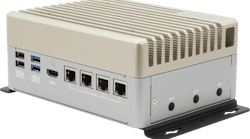FARNBOROUGH, England, 26 March 2007. QinetiQ in Farnborough, England, won a five-year $3.7 million contract from the United Kingdom Ministry of Defence (MOD) Research Acquisition Organization (RAO) to assess vulnerabilities of advanced military electronics to radiation that occurs naturally in space and at high altitudes (see related story).
The study will help MOD experts to manage the effects of radiation and avoid problems. QinetiQ will help the MOD define standards and policies for equipment and component suppliers.
Military equipment relies increasingly on commercially sourced components (related story) such as high-density memories, gate arrays, processors, and microelectromechanical systems (MEMS).
Unlike many components designed specifically for military use, such commercially available components are rarely hardened against radiation exposure. Therefore, the military must minimize risks and design out problems early on in development.
Radiation can compromise the reliability of advanced electronics operating at high altitudes, including aircraft, unmanned systems, and missiles. Even natural radiation at sea-level has the potential to cause problems for ground based equipment. In certain circumstances, exposure to radiation can cause component failure which in turn can cause problems at system level.
Drawing on experience of studying radiation, including four years of flights on the Concorde supersonic jetliner and the NASA space shuttle, QinetiQ will provide the MOD with tools to predict the reliability of electronic equipment at a range of altitudes from 100,000 feet down to sea-level.
QinetiQ will study the vulnerabilities of military systems to solar particle events, caused by sudden activity on the surface of the sun, during which radiation levels can increase by 1000 times those experienced normally. QinetiQ also will address the potential influence of always-present background radiation that peaks at 60,000 feet.
"The military use of advanced electronics developed in the commercial world is a reality. However, component failure in a fast jet is potentially far more serious than in a domestic PC," says David Joynson, research director for electronic systems at the RAO. "These components need to be sufficiently robust to perform the challenging tasks demanded of them and this contract award to QinetiQ is an important contribution towards ensuring future equipment programs are not compromised."
Scientists must do more research to better understand the potential effects of radiation. "The supply of electronic components is now driven by high-volume commercial markets, such as computers, consumer appliances, and telecommunications, and these are increasingly being used for military systems," says Ian Reid, managing director of QinetiQ's space division. "Understanding the vulnerabilities of these components to radiation exposure is hugely important for the MOD."
QinetiQ's radiation environment team was founded in the mid-1980s (then part of the Royal Aircraft Establishment) and has studied the effects of radiation on space systems ever since. In 1989 the group pioneered investigation of atmospheric radiation effects with a four year program of flights on the Concorde. By the mid-1990s the issue of radiation effects in advanced electronics on aircraft had become apparent and QinetiQ's work in this area has continued to grow.
QinetiQ's radiation monitors have been flown in the shuttle and a Merlin radiation monitor is currently deployed on GIOVE-A, the test-bed spacecraft for the European Galileo satellite navigation system. Merlin has also been selected to support NASA's "Living with a Star" programme and will help NASA to understand better how high-energy particles and radiation produced by the sun can affect life on Earth.
For more information contact QinetiQ online at www.qinetiq.com.


